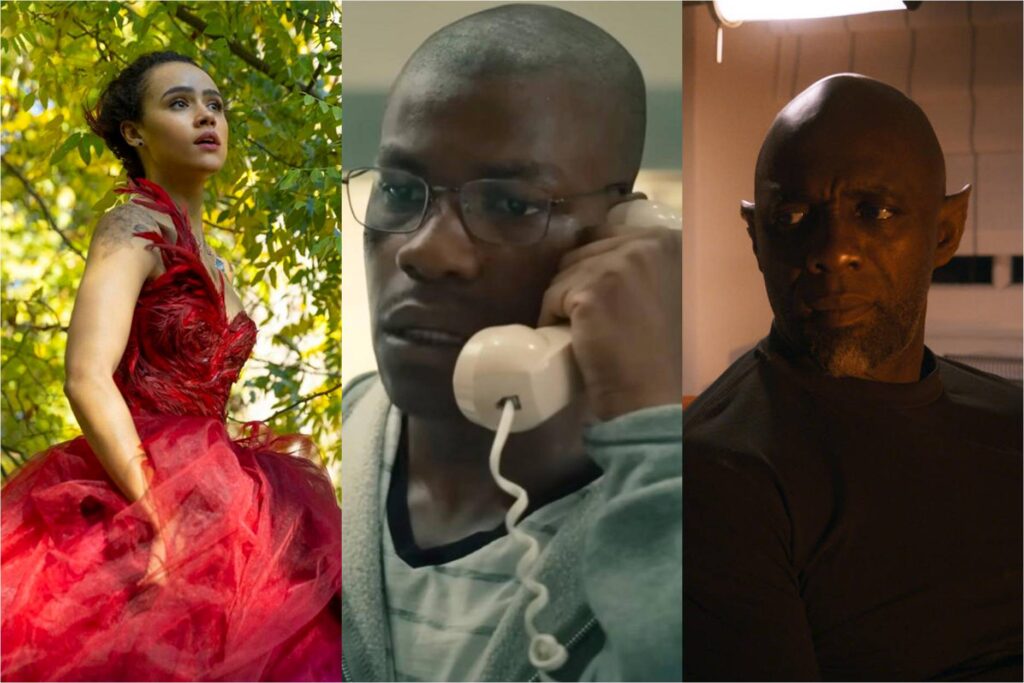
Immediately prior to my showing of Three Thousands Years of Longing, the director George Miller delivered a pretaped message, thanking viewers for spending the time and money to see his latest epic on the big screen. It was meant to infuse a commercial transaction—I was, after all, paying a corporation for its product—with a personal touch, and it worked, though not in the way Miller intended. Watching him natter amiably about the importance of cinema, I got the sense that he was speaking directly to me—not because his words were especially powerful, but because despite sitting in a gigantic auditorium, I was one of maybe 10 people in the theater.
This does not appear to have been a unique experience. According to Box Office Mojo, Three Thousand Years of Longing—Miller’s long-awaited (or apparently not) follow-up to Mad Max: Fury Road—earned a pitiful $2.9 million last weekend, despite playing in over 2,400 theaters and sporting a hefty $60 million budget. When it came to new releases doing meager business, it wasn’t alone. Breaking, a fact-based thriller about a bank robbery starring John Boyega, couldn’t even scrape up a million bucks in 900 theaters; it was outgrossed by the random re-release of Rogue One, a Star Wars spin-off playing on barely one-quarter as many screens. Even the weekend’s most nominally successful new arrival, the low-budget horror movie The Invitation, premiered in the top spot with a dubious asterisk attached: Ignoring the COVID-19 pandemic, its $6.8 million tally marked the lowest figure for a first-place debut in nearly 20 years.
This collective failure isn’t a new phenomenon. Much like January, late August is traditionally considered a cinematic dumping ground, when studios belch out unappetizing fare with no real expectation for success. (Remember The Happytime Murders, Leap, and War Room? Neither do I.) Still, that this year’s trio landed in the marketplace with such a resounding thud is unusually dispiriting, because it reflects the broader behavioral trend among American ticket-buyers: a willingness to venture out to theaters only for the sake of Event Movies—typically those featuring superheroes or otherwise perpetuating a long-running action franchise—at the expense of everything else, in particular original storytelling.
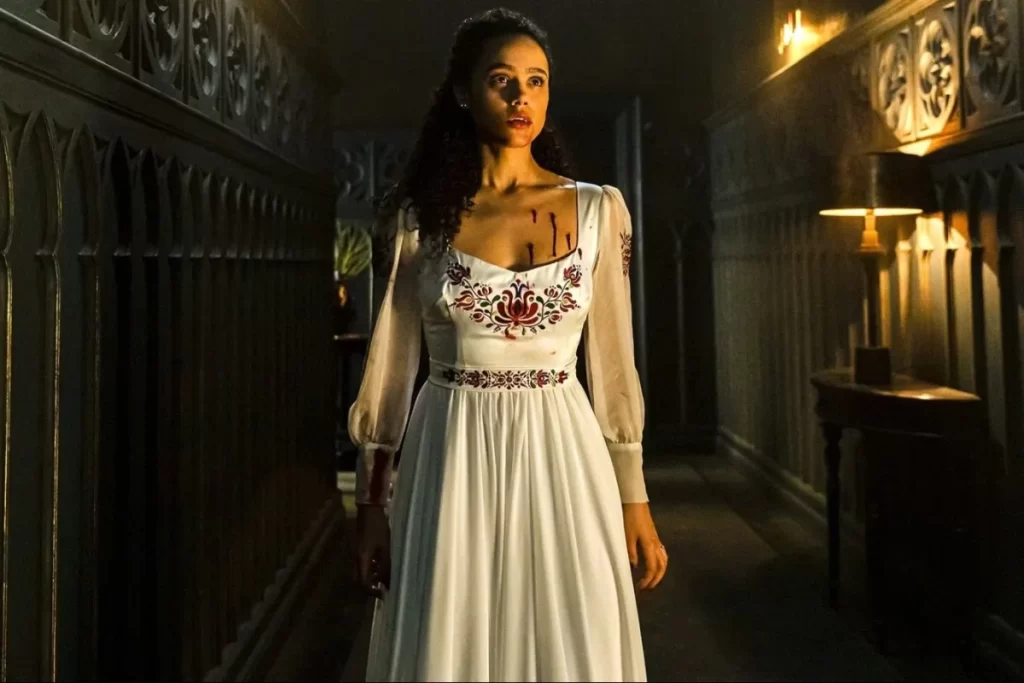
Now, I am not inclined to prophesy that the cinematic sky is falling. Every year, I publish a list of the best movies of the preceding 12 months, and every year, I marvel at the quality and diversity of the pictures that I had the good fortune to see. Even if you despair about Disney dominance and superhero supremacy and market consolidation, you must also concede that plenty of good movies—intimate dramas and brawling actioners, gripping thrillers and spiky comedies, nervy horror films and soaring musicals—keep getting made.
But for how much longer? Can this uneasy state of cohabitation—in which studios increasingly prioritize bankrolling monumental blockbusters while their independent divisions finance riskier fare (much of which is consigned to streaming services)—continue indefinitely? At what point does the prospect of green-lighting a new feature by Wes Anderson, Greta Gerwig, or Ari Aster shift from artistically palatable to economically unjustifiable?
Again, I am not convinced that cinema as we know it is currently emitting a death rattle, or that good movies of all shapes and sizes will suddenly stop existing. But while a comprehensive topographical survey of the entire landscape can scrounge up all sorts of rewarding pictures, a view of the mountaintop looks far more bleak. The runaway hit of 2022 is Top Gun: Maverick, the very long-awaited sequel to a 1986 smash that’s about to become the sixth film ever to break the $700 million barrier. The year’s other big hits thus far include a pair of Marvel sequels (Doctor Strange in the Multiverse of Madness and Thor: Love and Thunder), a superhero property under a different corporate banner (The Batman), another Jurassic World flick (Dominion), and additional installments in the Minions and Sonic the Hedgehog franchises. To be clear, I like some of these movies pretty well, and I don’t begrudge them their financial success. But the more that these fan-friendly, corporate-engineered productions dominate the box office, the harder it is to envision studios rolling the dice on more ambitious pictures that lack a link to existing intellectual property.
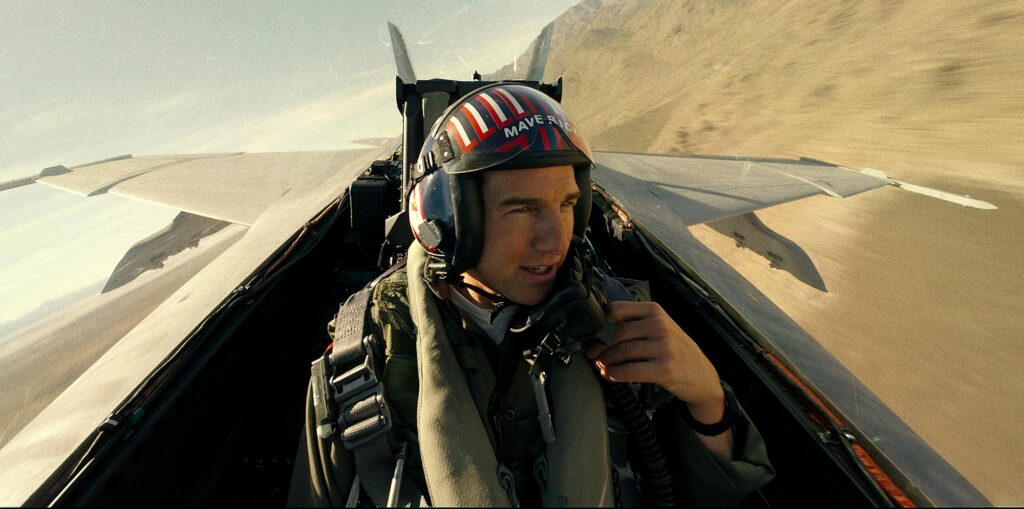
At the risk of talking out of both sides of my mouth: Even when it comes to significant money-makers, the big earners this year haven’t been entirely homogeneous. Baz Luhrmann’s Elvis ($148 million) showed that biopics can still make bank, Jordan Peele’s Nope ($118 million) reaffirmed the viability of the auteur-driven blockbuster, and The Lost City ($105 million) proved that good old-fashioned movie stars—in this case, Sandra Bullock and Channing Tatum—can still power original creations across that magical $100 million threshold. If anything, 2022 has proved a welcome if mild corrective to the prior year, when only two of the top 20 grossers (Encanto and Free Guy) were truly original creations (and in Free Guy’s case, “truly” is a bit of a stretch).
Yet these isolated success stories are plainly the exceptions that prove the rule of franchise hegemony. And the disturbing sweep of that rule has rarely been more apparent than this past weekend, when three strange and interesting and decidedly new movies combined to gross less in their first week of release than Maverick did in its eighth. Some have argued that the blame for this three-pronged dud falls to the respective studios for failing to adequately market their creations; as someone who endured the trailer for The Invitation roughly 25 times over the past three months, I question that premise as a matter of fact. Instead, I suggest that the fault here lies not with the advertising departments or the Facebook algorithms or the theatrical amenities or the films themselves. No, my theory of the case is simpler: The guilty party is you.
Well, not all of you. I’m compelled to check my privilege, and to acknowledge that not everyone has the disposable income and the personal flexibility to go to the movies every weekend. I also recognize that not everyone lives in an area of the country with easy access to a multiplex that shows the full gamut of wide releases. And I concede that for immunocompromised folks, the threat of COVID’s omicron variant shifts the standard cost-benefit analysis that attends theater-going.
The rest of you, however, are out of excuses. I can only speculate that you deemed these movies unworthy of your time, and far less valuable than, say, that videogame flick with Mark Wahlberg and Spider-Man ($149 million). If that’s the case, then kindly allow me to correct the record. None of last weekend’s debuts was a great movie, but they’re all movies that I’m grateful were made.
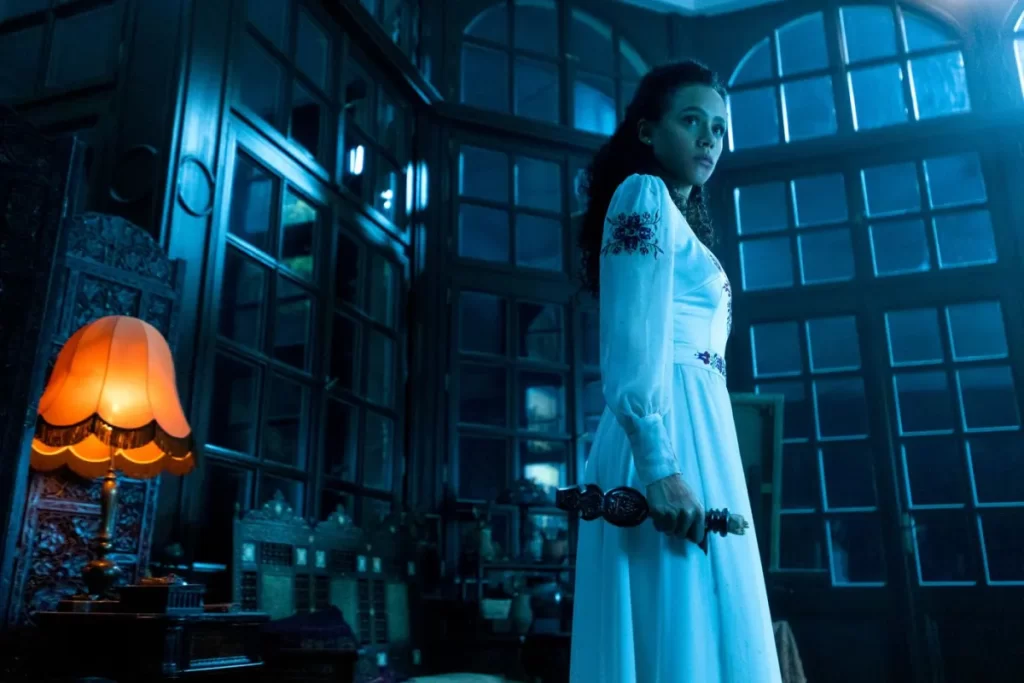
Consider The Invitation. It is not, strictly speaking, good. The story of a disconnected New York loner (Nathalie Emmanuel, from Game of Thrones and the more recent Fast & Furious films) who discovers that she’s related to an aristocratic clan across the pond, it gestures vaguely in the direction of goofy pulp horror, trying to hybridize the upper-crust satire of Ready or Not (not to mention Get Out) with the pure Gothic terror of Suspiria. But the director, Jessica M. Thompson, lacks both vision and ambition; the social commentary feels less barbed than muddled, while the set pieces never achieve the required excitement or momentum. And while the plot isn’t meant to be taken remotely seriously, it still falters even by the most forgiving standards; this is the kind of movie where a butler takes pains to safeguard a secret in a library, only to house the room’s ornate key in… a drawer right next to the door.
Still, there’s stuff to like here. The production design is appropriately foreboding, while the costume department has the good sense to clothe Emmanuel in some eye-catching dresses. Thomas Doherty sinks his teeth into the role of chief villain, channeling an evil Robb Stark. There’s a silly sequence set at a pool-side spa where the ridiculous editing turns a dainty manicure into a crucible of pain. And even if the film’s racial dimension is handled clumsily (those posh Englishmen sure do look awfully pale), at least it’s there.
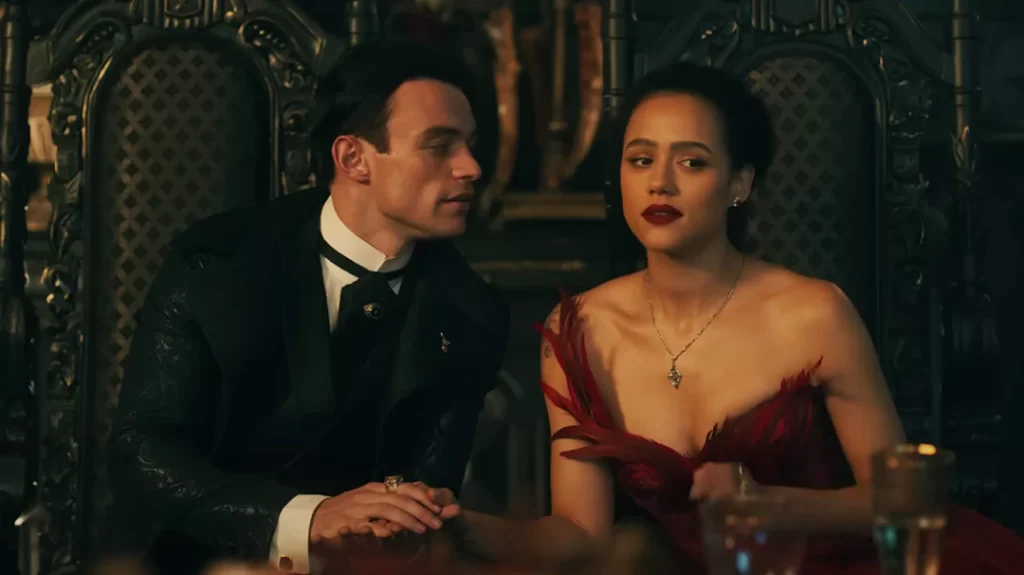
Beyond that, The Invitation is precisely the type of movie that deserves a chance to draw an audience. By which I mean, it’s a low-budget ($10 million) rendering of an original screenplay that develops its own twisted mythology, independent of any preexisting property or franchise. You know what other film shares those exact attributes? A little picture called Hereditary. Now, qualitatively speaking, those two movies don’t reside in the same universe, but they both only get made if studios are willing to bankroll weird projects with no obvious draw for audiences. And I’d much rather live in a world where both of them exist rather than neither.
But fine, let’s stipulate that the broadly negative reviews of The Invitation—or rather the lack of reviews, given that Sony declined to screen it for critics—scared you off. Fair enough, but you can’t wield that defense for the remaining options. Nor can you argue that Breaking, which was literally billed as “a modern-day Dog Day Afternoon,” lacks an appealing premise. It’s a bank-robber movie. Who the fuck doesn’t like bank-robber movies?
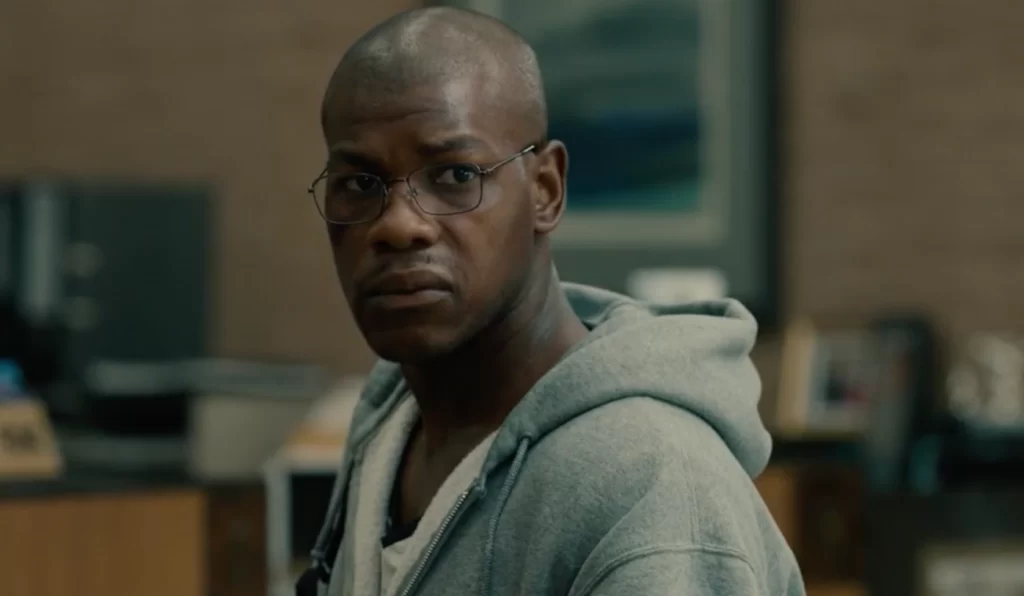
It’s also a pretty good one, if miles afield from that Sidney Lumet classic. Directed by Abi Damaris Corbin from a script she wrote with Kwame Kwei-Armah, it tells the true story of Brian Brown-Easley (Boyega); a former Marine, he opens the movie in handcuffs, as security guards unceremoniously escort him from a bureaucratic facility while tears stream down his face. As the film progresses, neither his mood nor his circumstances improves.
A minimalist thriller, Breaking chronicles Brian’s desperate hours after he walks into a Wells Fargo in Atlanta and calmly but firmly informs the cheerful teller that he’s carrying a bomb. What follows is tense, unsettling, and maybe not quite as suspenseful as you’d hope. Corbin takes care not to sensationalize Brian’s predicament—he’s despondent because the VA rerouted one of his disability checks to a college where he might have owed loans—and though her approach is thoughtful, it also caps the film’s potential energy. The scenes of police mobilizing and choreographing strategies seem compulsory, while moments when Brian converses with his precious daughter (via phone) can’t help but feel manipulative.
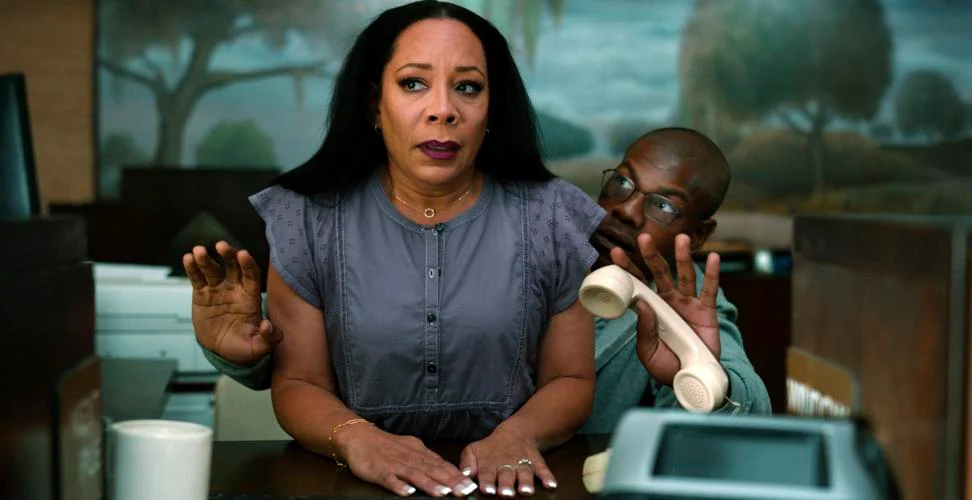
As a political document, Breaking is angry without being especially insightful. As an acting exercise, however, it’s terrific. Boyega plays Brian as a man who’s simultaneously measured and mad, and his volatility—his tendency to speak softly one moment and scream the next—is agonizing as well as alarming; we sympathize with him, but we also worry that he’s reached the end of his rope. Nicole Beharie (Miss Juneteenth), as the panicked but clear-headed manager who finds herself a hostage, helps ground the movie with her relatable fear; whereas Boyega is often in motion, she stays frozen, her brain operating several steps ahead of her body. And it is both wonderful and awful to see the late Michael K. Williams show up as an empathetic hostage negotiator, reminding us of how much he gave and how much he still had to give. (It is not lost on me that all three films featured in this piece star Black actors.)
Will any of them receive Oscar nominations? Certainly not, and also, who cares. The opportunity to see gifted actors practice their craft is rewarding on its own terms, and Breaking represents the kind of modest, performer-driven piece that should be cherished. Neither a blockbuster nor a prestige picture, it is instead a tidy genre entry that occupies a nebulous zone, one that’s interested in pure storytelling rather than massive profits or rapturous accolades. If the box-office receipts are any indication, that zone is shrinking by the day.
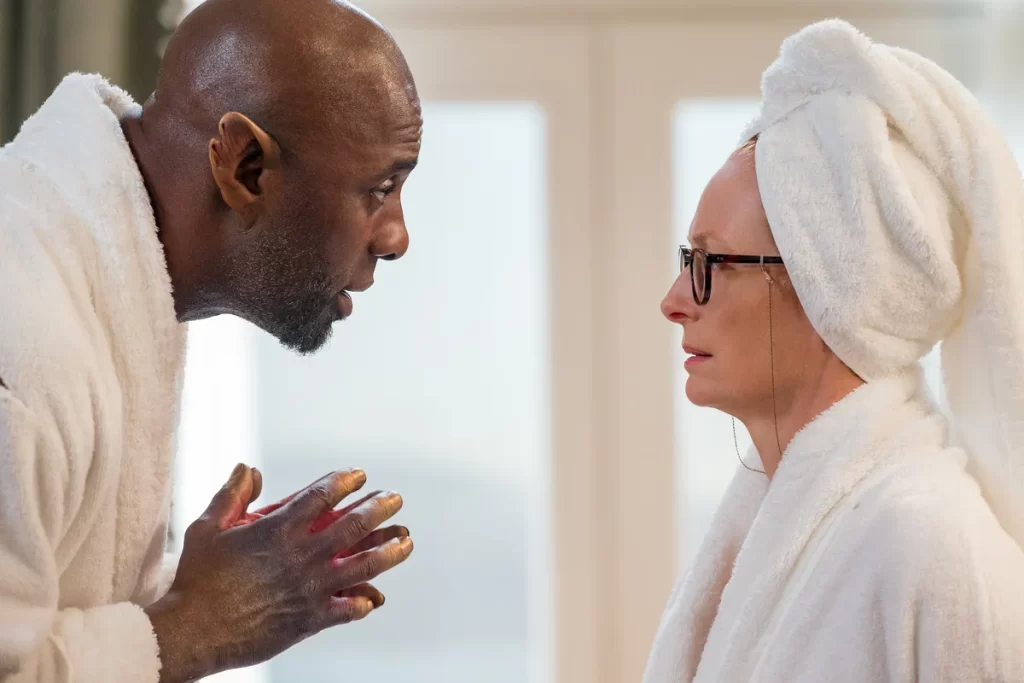
If Breaking is rigorously earthbound, Three Thousand Years of Longing is a magical flight of fancy. It’s been seven years since Miller sent his armada of bizarrely ornamented vehicles into the desert for Fury Road, and while the time away hasn’t sapped him of his gusto, he’s steered his talents in a decidedly different direction. To be sure, there is plenty of violence and death on display here, but the end result isn’t quite an action movie. It is instead… well, I’m not exactly sure what it is.
Which is part of its appeal. Rather than snugly nestling itself inside a single genre, Three Thousand Years bounces across classifications, sliding from character study to medieval epic to star-crossed romance and more beyond. It centers on Alithea (Tilda Swinton), a self-described narratologist with a bookish demeanor and a crimped red bob to match. After plucking a patterned memento from an Istanbul bazaar, she knocks off its top, and out whooshes a djinn (Idris Elba), a gigantic mystical creature with a bald head and pointy ears who promises to grant her—stop me if you’ve heard this before—three wishes.
What follows is less a tale of hubris and desire—in fact, Alithea is so content that she contemplates not wishing for anything at all, a musing that sends the djinn into supernatural spasms—than a picaresque adventure tale. The best stretch of Three Thousand Years entails the djinn recounting to Alithea the tribulations of his prior masters. These fantastical episodes—involving a biblical queen, a besotted concubine, a pair of princes (one bloodthirsty, the other exhibiting an entirely different sort of fetish), and a ravenous scholar—are enjoyable not because they are dramatically interesting, but because they afford Miller the opportunity to bend the cinematic canvas to his will. This is a majestic production on an operatic scale, and some of the images—the swirls of color, the writhing bodies, the sheer expanse of space and sky—feel yanked out of an altogether different universe.
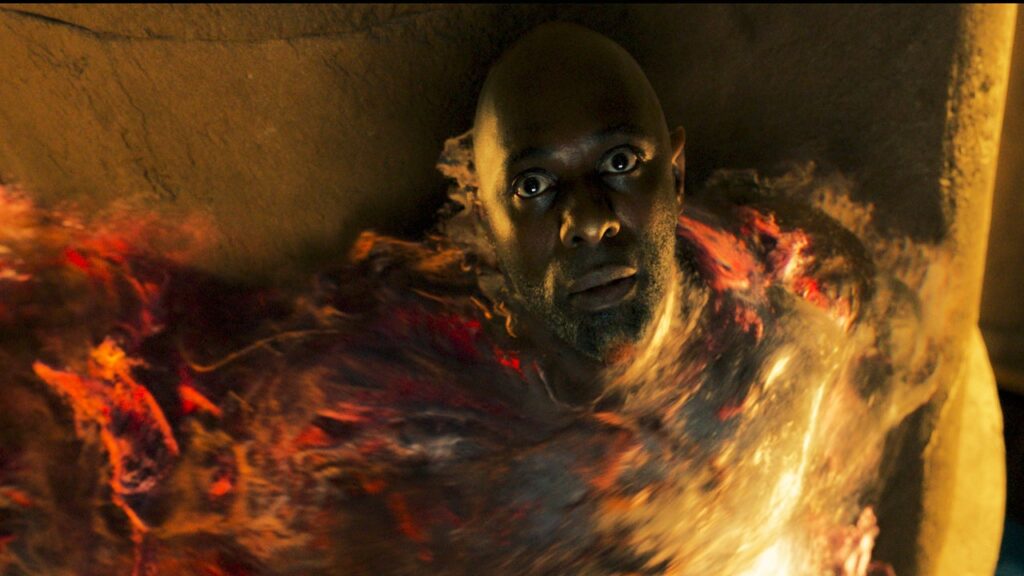
On an emotional level, the film is less persuasive. Alithea’s job is to examine the enduring power of myths, but Miller—who co-wrote the screenplay with Augusta Gore, adapting A.S. Byatt’s short story—is more invested in conjuring magnificent sights than in developing his characters. The script’s resolution of Alithea’s wish-related dilemma is abrupt, and a late pivot into domestic melodrama, while gratifyingly surprising, struggles to cohere with the preceding exoticism.
This doesn’t sully the movie’s extraordinary visual pleasures, or nullify its maniacal aspirations. Three Thousand Years of Longing is obviously less kinetic—and less satisfying—than Mad Max: Fury Road, but in terms of thematic and narrative breadth, it is the more ambitious and imaginative work. It’s the kind of absurd whatsit that’s worthwhile simply for its heedlessness, its unapologetic grandeur. It may have died an ignominious death at the box-office, but I suspect that it will be blessed with a lengthy and vigorous afterlife.
Of course, that afterlife is destined to unfold on streaming, even though a movie as resplendent and hypnotic and huge as Three Thousand Years deserves to be watched on the big screen. The Invitation and Breaking are far less aesthetically dazzling, but they have their own peculiar charms, and they don’t deserve relegation to the internet content wars. Again, none of these films is great—in fact, The Invitation is kinda bad—but we need to support their ilk, lest we lose the opportunity for superior versions of similar archetypes. These species of art are growing endangered. If we don’t act now—if we don’t support original productions by paying to see them in theaters—then I fear that come August 2027, I won’t be asking why you didn’t go to the movies. I’ll be asking why there aren’t any movies worth going to.
Jeremy Beck is the editor-in-chief of MovieManifesto. He watches more movies and television than he probably should.
